How to Choose a Heat Pump
We realise it can be overwhelming to decide what you are looking for when purchasing heating for your home; is a heat pump more energy efficient than a wood burner? What are the benefits of a heat pump versus a pellet fire or gas heating? Will it be cheaper to run a heat pump or gas central heating?
Endorsed by government agencies and consumer advocacy groups alike, heat pumps are known to be one of the most efficient forms of heating available. In addition to this, they offer features that other heating cannot, like dehumidifying, air filtration, safety and ease of use.

Energy Efficient
Government agency EECA (Energy Efficiency Conservation Authority) has identified heat pumps as one of the most energy efficient forms of heating available in New Zealand. This is because heat pumps do not create heat; they simply move available heat from one place to another. The little electrical energy that is needed is predominantly used to run the compressor.
In fact heat pumps are so efficient that typically, 1kW of electrical energy you put in, your heat pump will produce around 4kW of heat energy out. This efficiency is represented as a COP (Coefficient of Performance), a good heat pump, operated correctly will have a COP of around 4.
Compare this to:
Electric bar heater – COP of 1
Gas heating – typical COP of 0.85
Wood fire – typical COP of 0.65
What to look for:
When looking specifically at electrical appliances, Energy Rating Labels and the Energy Star® mark are good indicators of how well an appliance performs.
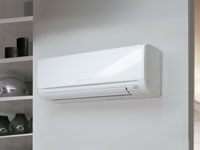
Lowest Running Costs
The more energy efficient a heating system is, the cheaper it is to run. While the initial investment in a heat pump may be larger than say, purchasing a gas heater, the long term savings on energy use are far greater.
Compared to all other common forms of heating, a heat pump is the most energy efficient and cheapest heating system to run.

Precise Comfort Control
A key benefit of heat pumps is higher comfort levels, Consumer states “heat pumps use a fan to distribute the warmed air, the heating spreads more evenly than most”. With some heating appliances such as woodburners the further you move away from the heat source the less heat you will feel, whilst others provide only spot heating (i.e. portable heaters).
Once your set temperature is reached a heat pump will maintain this, in contrast some appliances may continue to heat resulting in an uncomfortably hot room – you could spend the rest of your evening juggling settings to maintain the right comfort level!

Convenient
When choosing a heating appliance you should consider one that is low maintenance, easy to use and able to provide heat at the touch of a button ensuring you never have to compromise on comfort.
With a heat pump you can avoid the manual labour involved with fire wood, instead at the touch of a button you can have heat. Heat pumps are controlled by a thermostat, ensuring that your preferred temperature is maintained, there is no need to adjust settings the heat pump will do this automatically when required.
On cold winter nights take comfort in the fact you can come home to warmth with heat pump timers. All heat pumps come with a 24hour timer or a 7day timer, you can easily pre program your unit to start up or turn off according to your daily schedule, allowing you to enjoy total comfort with ease.
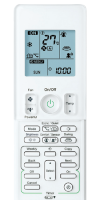
Improved Air Quality
A key benefit of a heat pump is the ability to filter the air that you are heating, getting rid of nasty allergens.
Important for both asthma and allergy sufferers, most heat pumps are fitted with advanced filtration systems to provide optimal air quality by filtering and deodorising the air. These two functions work together to remove even the tiniest airborne particles and break them down or neutralize them.
While systems like unflued gas heaters actually deplete the air quality and consume oxygen – heat pumps have been shown to improve air quality while keeping you warm.
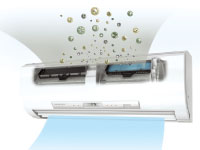
Unobtrusive Heating
As much as it is important to select the right capacity to heat your home, aesthetics are also a consideration for most heat pump purchasers. A unit which is unobtrusive, quiet and even able to complement existing décor are an important factor in deciding which heat pump best suits your home. The ever popular Wall Mounted (High Wall) range boasts an extensive variety of options. Floor Mounted heat pumps sit discreetly at floor level – ideal for replacement of older heat sources such as fireplaces or night store heaters. Heat pump solutions which are ceiling concealed are also gaining popularity for their unobtrusive design and versatility.
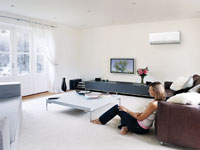
Humidity Control
Appliances like unflued gas heaters produce carbon dioxide and fill the air with unhealthy amounts moisture. Without adequate ventilation, this can be detrimental to the health of you and your family.
Heat pumps are actually able to dehumidify in cooling or “dry” modes enabling your heat pump to combat excess moisture such as condensation and humidity.
It must always be remembered that the three key elements to a healthy home are heating, insulation and ventilation.

Safety
The New Zealand Fire Service recommends clothing, furniture and children be at least a metre away from heaters and fires. Unlike gas burners or electric heaters, heat pumps are safe as they have no flames or hot surfaces that children can touch and burn themselves with.
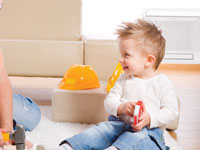
Cooling in Summer
New Zealand is predominantly a heating market – what is globally considered an air-conditioner is purchased by New Zealand consumers as a heat pump. The principle for providing air conditioned cooling works much in the same way as the heat pump generates heat, but instead of extracting freely available heat from outside air the unit reverses the process to extract cool air and pump this indoors. This is an added benefit for heat pump users, keeping the home nice and cool on those long hot summer days!
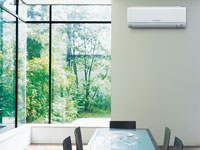
Health Benefits
We all know that a warmer, drier home has a positive effect on our health, and that living with household temperatures below 16°C can contribute to respiratory illness and premature mortality. In fact, while the World Health Organisation recommends a minimum indoor temperature of 18°C, a temperature 2-3°C higher for ‘at risk’ groups like; the eldery, young children and those with respiratory illnesses. It is for these reasons having adequate insulation, ventilation and heating in your home is vital.
It is with this in mind Heat Pumps provide;
- Improved air quality with built in air filtration systems.
- Humidity Control – the “Dry” function in cooling mode enables an air conditioner to combat excess moisture such as condensation and humidity.
- No oxygen consumption – heat pumps simply transfer heat energy from one place to another, unlike gas heaters which require oxygen in order for the gas to burn.
- Safety for children – there are no open flames or hot surfaces.

Environmental Sustainability
Heat pumps do not burn anything to provide heat energy, so other then the very small amount of electrical energy required for the compressor to operate, there are no additional carbon emissions. Compare this to the combustion process of wood burners which cause fumes, soot and smoke, creating a major burden on the environment in terms of its carbon emissions.


